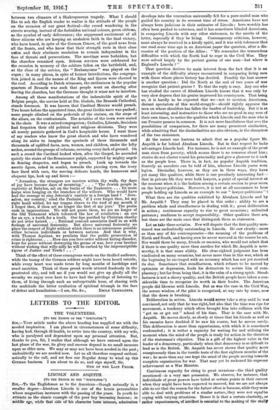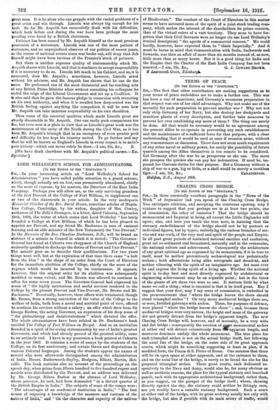LINCOLN AND ASQU/TH.
[To THE EDITOR OP THE " SPECTATOR:1
Sm,—To the Englishman as to the American—though naturally in a smaller degree—Abraham Lincoln is one of the heroic personalities whose magnetism increases with the passing of the years. In youth he attracts as the classic example of the poor boy becoming famous ; in middle age, while that side of this character loses interest, admiration
develops into the veneration universally felt for a pure-souled man who guided his country in its severest time of stress. Americans have not always been judicious in their estimates of Lincoln ; hero-worship has often been pushed to extremes, and it has sometimes blinded Americans, in comparing Lincoln with any other statesmen, to the merits of the latter, especially if they be living. Contemporary criticism, however, must always be received in a kindly spirit, and it was with tolerance that one read some time ago in an American paper the question, after a dis- cussion of the position of the Allies : " We remember the tremendous difficulties with which the North had to cope in the Civil War. They were solved largely by the patient genius of one man—but where is England's Lincoln ? "
That question derives its main interest from the fact that it is an example of the difficulty always encountered in comparing living mon with those whose places history has decided. Possibly the beet answer is another question : Did the North at the end of two years of war recognize that patient genius ? To that the reply is easy. Any one who has studied the career of Abraham Lincoln knows that it was only by very slow degrees that his genius impressed his countrymen. That being so, it is hardly to be expected that we—not to mention Americans, distant spectators of this world-struggle—should rightly appraise the men on whose shoulders has fallen the burden of leadership. But it is at least interesting, and instructive to those who see no good in any man of their own times, to notice the qualities which Lincoln and the man who is our Premier possess in common. It is not mere fancifulness that sees the possibilities of comparison, for there are many prominent similarities, while admitting that the dissimilarities are also obvious, in the characters of the two statesmen.
At the outset one hastens to admit that as a popular figure Mr. Asquith is far behind Abraham Lincoln. But in that respect he lacks advantages Lincoln had For instance, he is not an example of the great man risen from poverty, which means there is no romance about him ; stories do not cluster round his personality and give a glamour to it such as the people love. There is, in fact, no popular Asquith tradition. Scarcely an anecdote can be told of him, whereas Lincoln yarns were legion. Dissimilar, however, as they are in those ways, they have yet many like qualities, while there is one peculiarly interesting fact— that in private life they were both lawyers, a point of special interest at the moment when it is the fashion among a certain section to pour scorn on the lawyer-politician. Moreover, it is not at all uncommon to hear people holding up Lincoln as an example to our " lawyer-politicians" What then are the qualities exhibited by Abraham Lincoln and by Mr. Asquith ? They may be placed in this order : ability to see a problem whole and steadfastness in dealing with it ; great deliberation in action ; continuous capacity to rise to great occasions ; unlimited patience ; readiness to accept responsibility. Other qualities there are, but these are the main ones that distinguish them as statesmen.
Let us take these seriatim. Few will dispute that the first quality men- tioned was undoubtedly outstanding in Lincoln. He saw clearly—more so than any of his contemporaries—the meaning of the problems of North and South, and having seen he never wavered in the course he set. Nor would there be many, friends or enemies, who would not admit that if there is one quality more than another for which Mr. Asquith is note- worthy, it is that same ability. His clear-sighted judgment has been vindicated on many occasions, but never more than in this war, which at the beginning he envisaged with an accuracy which has not yet received its duo. Sometimes that steadfastness, which refuses to be moved by optimism or depression, leads his detractors to accuse him of com- placency ; but far from being that, it is the calm of a strong spirit. Stead. fastness is not a showy quality, and the British people have taken a con- siderable time to recognize its worth in their leader. The American people did likewise with Lincoln. But as was the case in the Civil War, the serene wisdom of the pilot is recognized, at any rate by some, now that the dawn is breaking.
Deliberation in action. Lincoln would never take a step until he was convinced, not only that he was right, but also that the time was ripe for movement, a tendency which often brought him into collision with the " get on or get out " school of his time. That is the case with Mr. Asquith. He moves slowly, so slowly at times that his friends as well as his enemies have doubted if he saw his course, but he moves surely. This deliberation is more than opportunism, with which it is sometimes confounded ; it is rather a capacity for waiting for and utilizing the moment when the mind of the people is ready for action in the direction of the statesman's objective. This is a gift of the highest value in the leader of a democracy, particularly when that democracy is so difficult to lead as is the British. Mr. Asquith has never shown that quality more conspicuously than in the terrific tests of the first eighteen months of the war ; he more than any one kept the mind of the people moving towards complete organization for war. That may yet be reckoned his /supreme achievement as a War Minister.
Continuous capacity for rising to great occasions—the third quality mentioned—is a very rare possession. We observe, for instance, that individuals of great powers have failed at certain points in their careers when they might have been expected to succeed, but we are not always able to see that the reason for the failure often is because, while they were able to deal with problems of a similar nature, they were not equal to coping with varying situations. Hence it is that a certain elasticity, or rather capaciousness, of intellect is essential to the making of the really
great man. It is he alone who can grapple with the varied problems of a great crisis and win through. Lincoln was always big enough for his task. So far Mr. Asquith has successfully dealt with his difficulties, which both before and during the war have been perhaps the most puzzling ever faced by a British statesman.
Patience has been named by Mr. Asquith himself as the most precious possession of a statesman. Lincoln was one of the most patient of statesmen, and no unprejudiced observer of our politics of recent years, or the course of national events since war broke out, will deny that Job himself might have been envious of the Premier's stock of patience.
But there is another supreme quality of statesmanship which Mr. Asquith shares with Lincoln, and that is readiness to accept responsibility if it is necessary to do so. Lincoln left much to his Cabinet, and so, it is rumoured, does Mr. Asquith ; sometimes, however, Lincoln acted without his advisers, and Mr. Asquith has shown that he can do the same. He performed one of the most dictatorial and far-reaching acts of any British Prime Minister when without consulting his colleagues he ended the reign of the Liberal Government and set up a Coalition. It is also said that ho gave the famous pledge in connexion with recruiting on his own authority, and when it is recalled how deep-seated was the British feeling against anything like compulsion it will be seen how Mr. Asquith can take immense responsibility on his own shoulders.
Thus some of the essential qualities which made Lincoln great are clearly discernible in Mr. Asquith. One can easily push comparisons too far, but es-en now it is plain to view that as Lincoln's great work was the maintenance of the unity of the North during the Civil War, so it has been Mr. Asquith's triumph that in an emergency of even greater peril and difficulty he has kept his country united. To go further and say that ho will be known as England's Lincoln in every respect is to antici- pate history—which can never safely be done.—I am, Sir, &c., Z. [We have dealt elsewhere with Mr. Asquith's political career.—ED. 8pcdator.]































 Previous page
Previous page